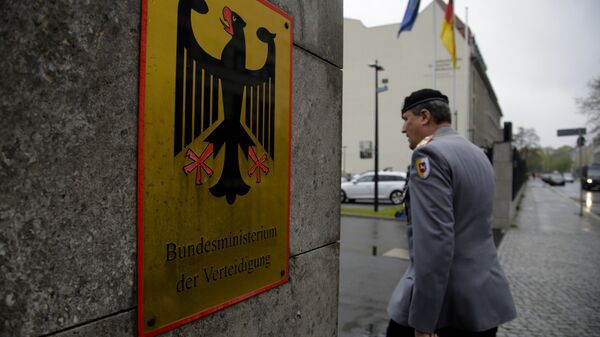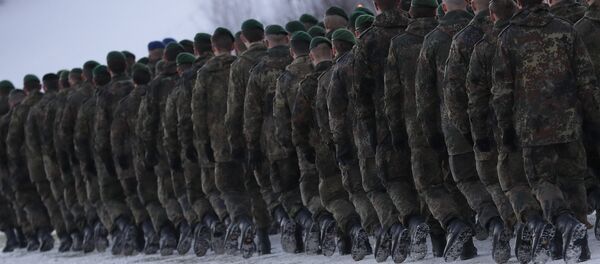A local newspaper reported a network of extremists involved with the controversial extremist Identitarian Movement has been multiplying for years at the Bundeswehr University in Munich, an institution that aims to equip service members for future careers outside the military.
The Movement, which boasts an estimated 500 members and calls for a return to "traditional national values" is being monitored by domestic intelligence agency BfV for possibly breaching the country's constitutional rules on xenophobia.
Hipster-Fascist 'Identitäre Bewegung' attempting a protest in central Berlin. Bemused onlookers giving them a piece of their mind. pic.twitter.com/gFoXb8GBPx
— Alasdair (@ralasdair) May 19, 2017
On the same day the report was published, 50 members of the group attempted to storm the Justice Ministry headquarters, driving a rental truck toward the building, narrowly missing an official. Protesters then attempted to scale the roof using a 10-meter (32-foot) ladder while throwing lit fireworks into the street.
They called for Justice Minister Heiko Maas to step down, and for the borders of the European Union and Germany to be strengthened. Some participants wore uniforms evoking the former German Democratic Republic's People's Police. Police quelled the rush, and the leader of the group was arrested — although 20 protesters remained outside the barricaded Ministry hours later, holding a banner criticizing the prohibition of opinion.
The group's activists have mounted a number of high-profile publicity stunts, including climbing the Brandenburg Gate August 27, hanging a banner on the monument reading "secure borders, secure future."
The revelation adds further pressure to the Bundeswehr, at a time the military counterintelligence agency, MAD, is examining around 300 cases of alleged far-right extremism in its ranks.
Investigations include four students at the University suspected of having ties to far-right movements. The probe is scrutinizing direct and indirect links between the quartet and a first lieutenant in custody since late April on suspicion of planning terrorist attacks, known as "Franco A."
28-year old "Franco" is accused of planning an attack targeting asylum seekers and left-wing politicians, including Social Democrat Interior Minister Heiko Maas and former President Joachim Gauck
The German citizen applied for asylum as a Syrian refugee in the German town of Giessen in late 2015, subsequently being granted asylum, shelter and benefits the following January. Officials bizarrely did not notice the alleged Syrian refugee was of German descent, and did not speak Arabic. Officials claim he planned to commit serious crimes to discredit refugees, deliberately leaving his fingerprints — stored in the refugee database under his assumed identity — at crime scenes.
The arrest was particularly damaging to the Bundeswehr, given top brass had serious proof of his far-right affinities in 2014 at least, but opted to look the other way. Since his arrest, two accomplices have also been captured by authorities — and it has been revealed that not only were they able to get away with their machinations for considerable time without arrest, they were able to steal ammunition from military stockpiles.
In response, Defense Minister Ursula von der Leyen launched a major inquiry into the Bundeswehr, and has proposed a major reform package. Suggestions include a review of the 1982 "decree on traditions" which allows for the display of Nazi-era Wehrmacht memorabilia within certain "historical contexts." Despite these efforts, von der Leyen has been criticized for mismanaging the crisis, and accused of doing too little, too late. The Defense Ministry has also come under pressure after it was revealed a number of soldiers have been collecting Nazi mementos, and several military installations were still named after Wehrmacht leaders.
Other investigations into "far-right actions" in the Bundeswehr include soldiers saying "Heil Hitler," performing Nazi salutes and calling for violence against migrants in their own ranks — crimes punishable with prolonged jail terms under the German Criminal Code, and contrary to military guidelines on speech. Even ironically articulating political views hostile to German law is considered a "contravention of core military duty" — in one instance under investigation, a soldier posted hate speech on a Facebook page associated with far-right party NPD, calling for the deaths of "typical foreigners." In all, over 2,500 cases of right-wing extremism have been reported to Germany's military authorities since compulsory military service ended in 2011.
#Germany
— Daniel Heinke (@daniel_heinke) May 9, 2017
Right-wing terrorist cell in #Bundeswehr (German armed forces): Second officer (1st Lt) arrested, suspected of plotting attack. pic.twitter.com/1Y7MH2Y4oH
MAD has suggested neo-Nazi sentiment is most prevalent among 18- to 25-year-old soldiers, whose obsession with weaponry, order and hierarchies attract them to the military. However, complicating things for authorities is that even if these individuals are identified, getting rid of them isn't particularly easy — their sympathies must be proven in court, and often such leanings are only discovered when it's too late. For example former soldier "Andre E" is on trial for his involvement with the National Socialist Underground, a terror group accused of perpetrating wave of bombing attacks and 10 murders in the 2000s.
Moreover, ridding the Bundeswehr of right-wing elements may be made even more difficult given extremism of this bent is on the rise in Germany itself. An intelligence service report suggests in 2015, the number of violent crimes — including threats, arson, and attempted homicides — committed by right-wing terrorists rose 42 percent, with crimes targeting foreigners hitting a historic post-2001 record.



